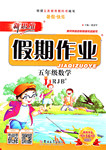题目内容
Many policemen and soldiers are ______ the forest _____ the prisoner escaping from prison.
A. searching for; searching B. searching; searching
C. searching; in search of D. in search for; searching for
C

练习册系列答案
 新思维假期作业寒假吉林大学出版社系列答案
新思维假期作业寒假吉林大学出版社系列答案
相关题目